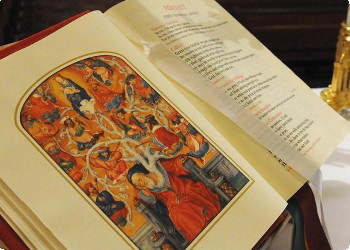Let the children come to me
25 MAY (Mk 10,13-16)
We know the Lord calls in his service since one is in his mother’s womb. Some were first called and then conceived. Others, like Samuel, were first asked to the Lord and then offered to him, so that they served in his holy tent.
There was a certain man from Rama-thaim, Elkanah by name, a Zuphite from the hill country of Ephraim. He was the son of Jeroham, son of Elihu, son of Tohu, son of Zuph, an Ephraimite. He had two wives, one named Hannah, the other Peninnah; Peninnah had children, but Hannah was childless. This man regularly went on pilgrimage from his city to worship the Lord of hosts and to sacrifice to him at Shiloh, where the two sons of Eli, Hophni and Phinehas, were ministering as priests of the Lord. When the day came for Elkanah to offer sacrifice, he used to give a portion each to his wife Peninnah and to all her sons and daughters, but a double portion to Hannah because he loved her, though the Lord had made her barren. Her rival, to upset her, turned it into a constant reproach to her that the Lord had left her barren. This went on year after year; each time they made their pilgrimage to the sanctuary of the Lord, Peninnah would approach her, and Hannah would weep and refuse to eat. Her husband Elkanah used to ask her: “Hannah, why do you weep, and why do you refuse to eat? Why do you grieve? Am I not more to you than ten sons?”
Hannah rose after one such meal at Shiloh; at the time, Eli the priest was sitting on a chair near the doorpost of the Lord’s temple. In her bitterness she prayed to the Lord, weeping copiously, and she made a vow, promising: “O Lord of hosts, if you look with pity on the misery of your handmaid, if you remember me and do not forget me, if you give your handmaid a male child, I will give him to the Lord for as long as he lives; neither wine nor liquor shall he drink, and no razor shall ever touch his head.” Early the next morning they worshiped before the Lord, and then returned to their home in Ramah. When Elkanah had relations with his wife Hannah, the Lord remembered her. She conceived, and at the end of her term bore a son whom she called Samuel, since she had asked the Lord for him. The next time her husband Elkanah was going up with the rest of his household to offer the customary sacrifice to the Lord and to fulfill his vows, Hannah did not go, explaining to her husband, “Once the child is weaned, I will take him to appear before the Lord and to remain there forever; I will offer him as a perpetual nazirite.” Her husband Elkanah answered her: “Do what you think best; wait until you have weaned him. Only, may the Lord bring your resolve to fulfillment!” And so she remained at home and nursed her son until she had weaned him. Once he was weaned, she brought him up with her, along with a three-year-old bull, an ephah of flour, and a skin of wine, and presented him at the temple of the Lord in Shiloh. After the boy’s father had sacrificed the young bull, Hannah, his mother, approached Eli and said: “Pardon, my lord! As you live my lord, I am the woman who stood near you here, praying to the Lord. I prayed for this child, and the Lord granted my request. Now I, in turn, give him to the Lord; as long as he lives, he shall be dedicated to the Lord.” She left him there (1Sam 1,1-28).
Ancient Scripture tells us that many were the children with a mysterious conception and birth. The last in order of time, but not so as to make of them right away true tools for the mission of salvation. Jesus inverts the behaviour of his Father. Today, he tells his disciples that he runs through the opposite way: he takes adults but to make children out of them; otherwise, never might he build his kingdom on our earth.
And people were bringing children to him that he might touch them, but the disciples rebuked them. When Jesus saw this he became indignant and said to them, “Let the children come to me; do not prevent them, for the kingdom of God belongs to such as these. Amen, I say to you, whoever does not accept the kingdom of God like a child will not enter it.” Then he embraced them and blessed them, placing his hands on them.
A child is the one who receives and welcomes everything. He is the one whose life is not in his hands. In all he is dependent on others. Jesus wants his disciples to depend totally on Him, on His grace, truth, love, justice, Word, holiness and will. The child is an empty bag to be completely filled. They must become empty bags to be filled to the brim with Jesus and the Holy Spirit. If an adult is not emptied of all the pride that is in him, never might he be filled with the Holy Spirit and Jesus and never might he be kingdom of God.
Virgin Mary, Mother of the Redemption, Angels and Saints make empty bags of us.





